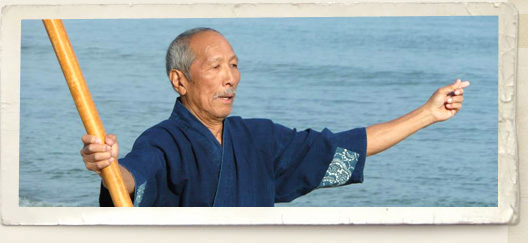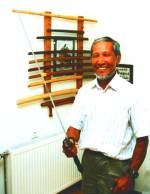
Interview - 2001
Kimiyoshi Suzuki lives in Pécs since 1992. He was born in 1934, in Tokyo, where he spent his childhood years. The family originally lived in New York, where his father - who was a well known photographer - opened his first own photo studio, and gallery. They moved back to Japan in 1932 on the request of the grandparents. Opening and running a new studio was a much harder work in their home country, than the US, but in spite of the difficulties, the young Kimiyoshi got infected with the art of his father. He completed his studies in Japan, and graduated from university in 1957, majoring in photographing. First he worked as a photo-reporter for minor Japanese newspapers for three years, then following his fathers' steps, he decided to open his own studio, with the help of his brother. He has a doughter and a grandchild, they still live in Tokyo.
 -
What was Japan like in your childhood?
-
What was Japan like in your childhood?
-
Those years wasn't easy for our family. The whole country was pervaded by a strong militariy spirit. Because my father and mother moved back to Japan from the US, and spoke English perfectly, the authorities thought they are American spies. Thats why my father wanted me, and my brother to learn karate and kendo, that were very popular national sports then, and doing one of them was almost obligatory for everyone. We had to do both.
- You are very busy here in south-Hungary. You teach various martial
arts in Pécs, you hold seminars all over the country, and you are just
through two summer camps. How did you start teaching in Hungary?
- A few years ago, young local students asked me to teach them. I have practised martial arts in all my life, and I have high ranks in both kendo and karate (6th dan), so I'm used to teaching. I keep lessons three times a week. Goju Ryu in karate, and a traditional style of kendo [Kenjutsu], based on strong defence, and meditation. We start our sessions with traditional ceremonies. It's pretty hard, but most of my sutdents have some experience in other martial arts.
- Do you still do photographing?
- Only when I'm directly asked. And only for my friends. I've done this for all my life, I've had enough. In fact, I've used three or four rolls of film every day, when I was active.
- How did you make contact with Hungarians?
- Back in 1986, five Hungarian artists arrived to Tokyo to visit a friend of mine. One day my friend was too busy, and asked me to escort the Hungarians around Tokyo. We had a very good time, so later they invited me back to Hungary. Many Hungarians know their names: Ágnes Kertészfi, Gábor Rideg or Csaba Karvaly.
- But finally, you stuck here. Why?
- Because I liked it. Pécs is a beautiful town, and the air is fine here, among the hills. Many of my friends live here already. I even got married here.
- What do you think of Hungarian people? How do a Japanese person see us?
- Hungarians are very kind and friendly, creative and opened. Though they are very bureaucratic as well. Officials and authorities aren't too helpful. You have to knock on too many doors, to achieve anything, but I have to admit, that I see a lot of improvements on this field nowadays. I think Hungarians like to have fun, and they like life in a good way. They are much more extroverted compared to the Japanese. The families are different as well. We teach our children to be independent from a very young age. Hungarian mothers keep their children safe for long.
- What was the hardest thing to adapt here?
- That Hungarians tell things straight to you, negative or positive. In Japan, it is impolite to tell something negative in the eyes of someone. I know that this isn't good, but it's still hard for me to get used to.
- What places you like the most?
- Pécs of course, and Magyarhertelendet. I love the hills of Mecsek
alltogether. They remind me of Japanese lands.
(http://www.baranyanet.hu/magazin/2001_3/nezopont.htm)
